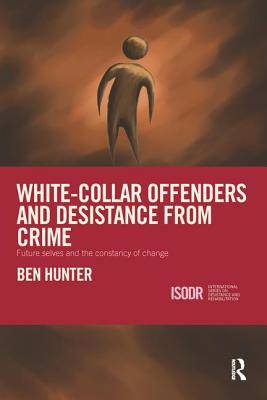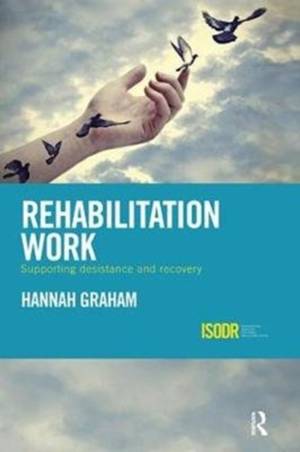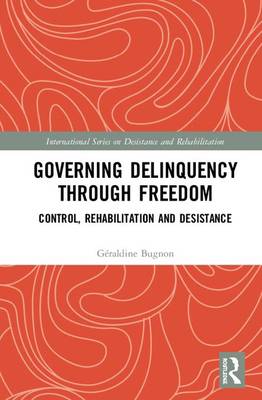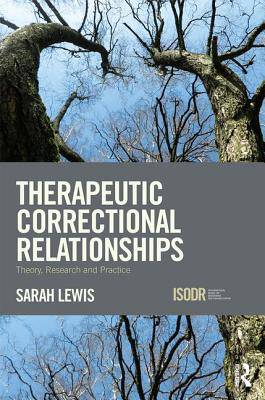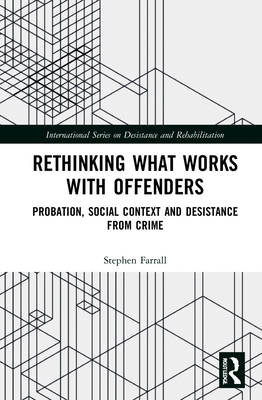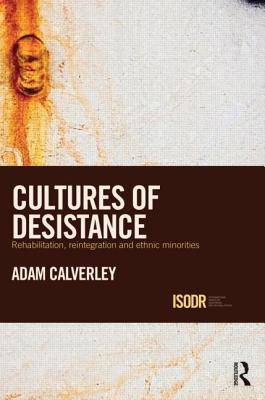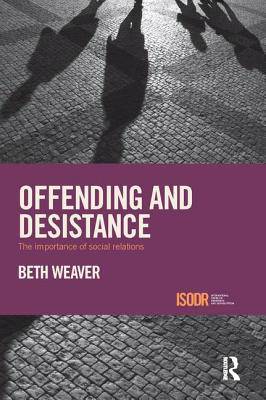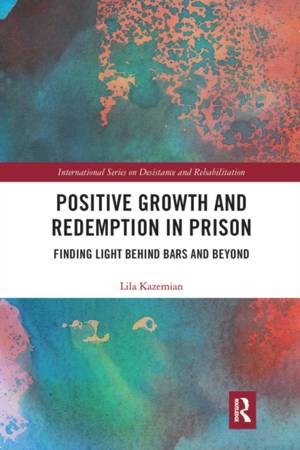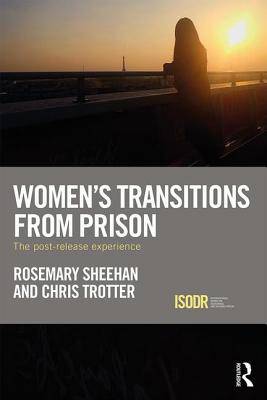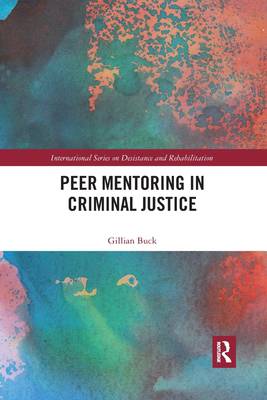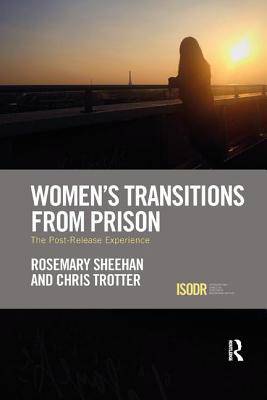
- Retrait gratuit dans votre magasin Club
- 7.000.000 titres dans notre catalogue
- Payer en toute sécurité
- Toujours un magasin près de chez vous
- Retrait gratuit dans votre magasin Club
- 7.000.0000 titres dans notre catalogue
- Payer en toute sécurité
- Toujours un magasin près de chez vous
-
White-Collar Offenders and Desistance from Crime
Ben Hunter
- Livre relié | Anglais | International Desistance and Rehabilitation
- This book considers how white-collar offenders come to desist from crime, how they make sense of their experiences and how these offenders differ from... Savoir plus
305,45 €Livraison 2 à 3 semaines305,45 €Livraison 2 à 3 semaines -
Being and Becoming an Ex-Prisoner
Diana Johns
- Livre broché | Anglais | International Desistance and Rehabilitation
- This book casts new light on men's experience of release from prison. Drawing on research conducted in Australia, it speaks to the challenges facing p... Savoir plus
94,95 €Livraison 2 à 3 semaines94,95 €Livraison 2 à 3 semaines -
White-Collar Offenders and Desistance from Crime
Ben Hunter
- Livre broché | Anglais | International Desistance and Rehabilitation
- This book considers how white-collar offenders come to desist from crime, how they make sense of their experiences and how these offenders differ from... Savoir plus
97,95 €Livraison 2 à 3 semaines97,95 €Livraison 2 à 3 semaines -
Being and Becoming an Ex-Prisoner
Diana Johns
- Livre relié | Anglais | International Desistance and Rehabilitation
- This book casts new light on men's experience of release from prison. Drawing on research conducted in Australia, it speaks to the challenges facing p... Savoir plus
290,45 €Livraison 2 à 3 semaines290,45 €Livraison 2 à 3 semaines -
Rehabilitation Work
Hannah Graham
- Livre broché | Anglais | International Desistance and Rehabilitation
- Conversations about rehabilitation and how to address the drugs-crime nexus have been dominated by academics and policymakers, without due recognition... Savoir plus
102,45 €Livraison 2 à 3 semaines102,45 €Livraison 2 à 3 semaines -
Prison Education and Desistance
Geraldine Cleere
- Livre relié | Anglais | International Desistance and Rehabilitation
- This book explores prisoners' experiences of prison education and investigates whether participation in education contributes to an offender's ability... Savoir plus
290,45 €Livraison 2 à 3 semaines290,45 €Livraison 2 à 3 semaines -
Governing Delinquency Through Freedom
Géraldine Bugnon
- Livre relié | Anglais | International Desistance and Rehabilitation
- This book analyses the non-custodial government of young offenders in two major cities in Brazil. In doing so, it delves into the paradox of an instit... Savoir plus
290,45 €Livraison 2 à 3 semaines290,45 €Livraison 2 à 3 semaines -
Penal Cultures and Female Desistance
Linnéa Österman
- Livre broché | Anglais | International Desistance and Rehabilitation
- Drawing on comparative research offering insight into the female journey towards desistance in Sweden and England, this book considers how the lived e... Savoir plus
90,45 €Livraison 2 à 3 semaines90,45 €Livraison 2 à 3 semaines -
The Architecture of Desistance
- Livre broché | Anglais | International Desistance and Rehabilitation
- Bringing together leading figures, and drawing upon case studies from around the world, this book seeks to fill a vacuum in the contemporary literatur... Savoir plus
85,45 €Livraison 2 à 3 semaines85,45 €Livraison 2 à 3 semaines -
Therapeutic Correctional Relationships
Sarah Lewis
- Livre relié | Anglais | International Desistance and Rehabilitation
- This book examines therapeutic correctional relationships within rehabilitative practice. It draws upon primary research that investigated the nature ... Savoir plus
320,95 €Livraison 2 à 3 semaines320,95 €Livraison 2 à 3 semaines -
Gender, Prison and Reentry Experiences
Silvia Gomes, Dixie Rocker
- Livre relié | Anglais | International Desistance and Rehabilitation
- This book explores the unique reentry experiences of incarcerated men and women who are about to be released from prisons in Portugal. Savoir plus
290,45 €Livraison 2 à 3 semaines290,45 €Livraison 2 à 3 semaines -
Rethinking What Works with Offenders
Stephen Farrall
- Livre relié | Anglais | International Desistance and Rehabilitation
- The Twentieth Anniversary edition of Rethinking What Works with Offenders contains the original text along with a new chapter by the author reporting ... Savoir plus
290,45 €Livraison 2 à 3 semaines290,45 €Livraison 2 à 3 semaines -
The Architecture of Desistance
- Livre relié | Anglais | International Desistance and Rehabilitation
- The volume of studies into desistance has grown dramatically in recent years. Much of this research has focused on the internal dynamics of desistance... Savoir plus
195,95 €Livraison 1 à 2 semaines195,95 €Livraison 1 à 2 semaines -
Cultures of Desistance
Adam Calverley
- Livre broché | Anglais | International Desistance and Rehabilitation
- Cultures of Desistance explores how structural (families, friends, peer groups, employment, social capital) and cultural (religion, values, recognitio... Savoir plus
105,45 €Livraison 2 à 3 semaines105,45 €Livraison 2 à 3 semaines -
Living with Desistance
David Honeywell
- Livre relié | Anglais | International Desistance and Rehabilitation
- In this new and distinctive contribution to the desistance literature, Dr David Honeywell draws on his own lived experience to consider his route thro... Savoir plus
290,45 €Livraison 2 à 3 semaines290,45 €Livraison 2 à 3 semaines -
Black Men, Invisibility and Crime
Martin Glynn
- Livre relié | Anglais | International Desistance and Rehabilitation
- Martin Glynn builds on recent empirical research in the UK and the USA and uses Critical Race Theory as a framework for developing a new theory of des... Savoir plus
305,45 €Livraison 2 à 3 semaines305,45 €Livraison 2 à 3 semaines -
Offending and Desistance
Beth Weaver
- Livre broché | Anglais | International Desistance and Rehabilitation
- In this book, Beth Weaver examines the role of a co-offending peer group in shaping and influencing offending and desistance and explores the life sto... Savoir plus
94,95 €Livraison 2 à 3 semaines94,95 €Livraison 2 à 3 semaines -
Desistance Transitions and the Impact of Probation
Sam King
- Livre relié | Anglais | International Desistance and Rehabilitation
- Moving away from criminal behaviour can be fraught with difficulties. Often it can involve leaving behind old habits, customs, and even friends, while... Savoir plus
190,95 €Livraison 2 à 3 semaines190,95 €Livraison 2 à 3 semaines -
Prison Education and Desistance
Geraldine Cleere
- Livre broché | Anglais | International Desistance and Rehabilitation
- This book explores prisoners' experiences of prison education and investigates whether participation in education contributes to an offender's ability... Savoir plus
85,45 €Livraison 2 à 3 semaines85,45 €Livraison 2 à 3 semaines -
Positive Growth and Redemption in Prison
Lila Kazemian
- Livre broché | Anglais | International Desistance and Rehabilitation
- Drawing on an original longitudinal study of French prisoners, this book assesses the similarities and differences in prison experiences across differ... Savoir plus
85,45 €Livraison 2 à 3 semaines85,45 €Livraison 2 à 3 semaines -
Desistance and Societies in Comparative Perspective
Dana Segev
- Livre broché | Anglais | International Desistance and Rehabilitation
- This book explores how societies and cultures shape desistance processes and experiences. It offers findings from a cross-national comparative mixed-m... Savoir plus
85,45 €Livraison 2 à 3 semaines85,45 €Livraison 2 à 3 semaines -
Women's Transitions from Prison
Rosemary Sheehan, Chris Trotter
- Livre relié | Anglais | International Desistance and Rehabilitation
- Based on extensive Australian research, this book considers how women manage their correctional obligations and re-settle in the community after priso... Savoir plus
290,45 €Livraison 2 à 3 semaines290,45 €Livraison 2 à 3 semaines -
Peer Mentoring in Criminal Justice
Gillian Buck
- Livre broché | Anglais | International Desistance and Rehabilitation
- This book offers the first in-depth analysis of peer mentoring in criminal justice. Drawing upon a rigorous ethnographic study of multiple community o... Savoir plus
85,45 €Livraison 2 à 3 semaines85,45 €Livraison 2 à 3 semaines -
Women's Transitions from Prison
Rosemary Sheehan, Chris Trotter
- Livre broché | Anglais | International Desistance and Rehabilitation
- Based on extensive Australian research, this book considers how women manage their correctional obligations and re-settle in the community after priso... Savoir plus
94,95 €Livraison 2 à 3 semaines94,95 €Livraison 2 à 3 semaines







